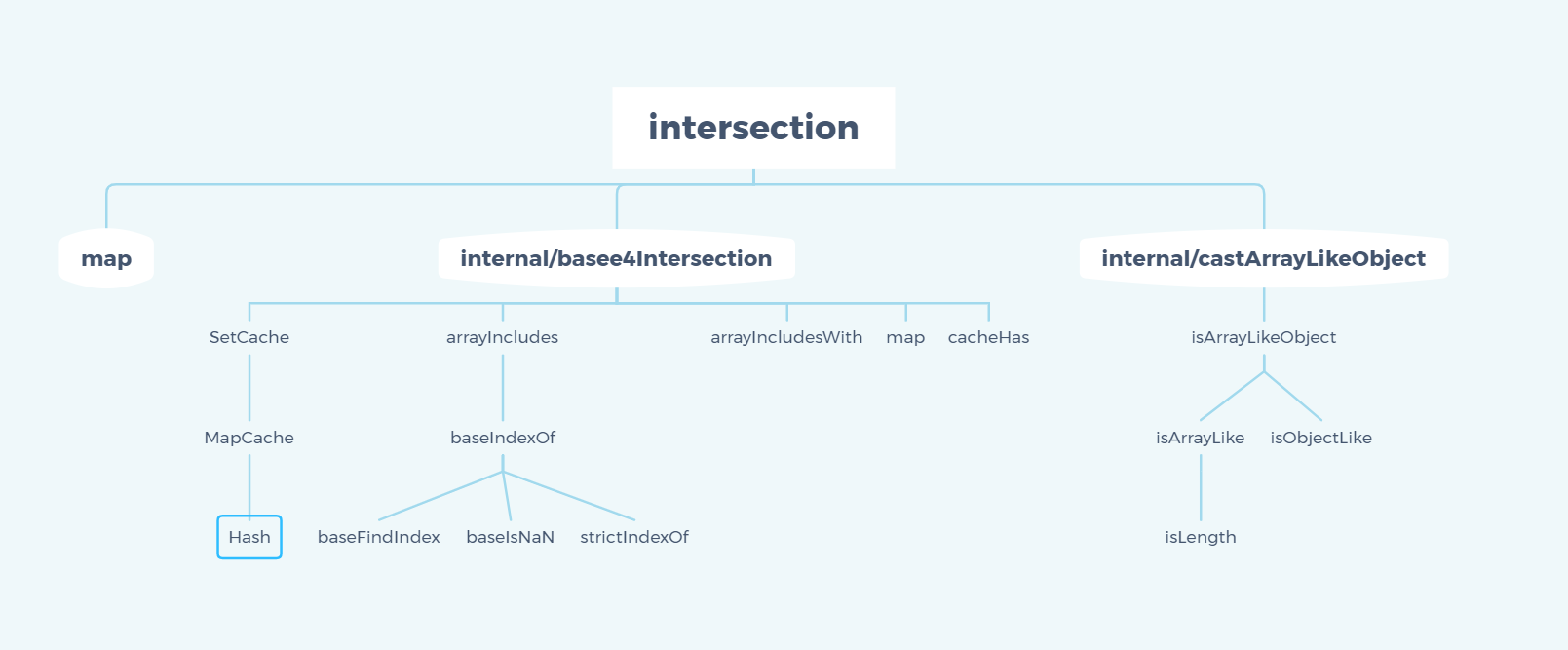A modern JavaScript utility library delivering modularity, performance & extras.
lodash是一个一致性、模块化、高性能的JavaScript实用工具库
# 一、环境准备
lodash版本v4.0.0通过
github1s网页可以 查看 (opens new window)lodash - intersection源码调试测试用例可以
clone到本地
git clone https://github.com/lodash/lodash.git
cd axios
npm install
npm run test
# 二、结构分析

这是一张 intersection 依赖引用路径图,相对复杂一些,按照功能划分,大致包括baseIntersection模块、castArrayLikeObject模块。接下来会自底向上分析各个依赖模块,包含strictIndexOf、baseIsNaN、baseFindIndex、baseIndexOf、arrayIncludes、Hash、MapCache、SetCache、arrayIncludesWith、map、cahceHas、isLength、isArrayLike、isObjectLike、isArrayLikeObject、castArrayLikeObject、basee4Intersection、intersection。
# 三、函数研读
# 1. strictIndexOf 模块
indexOf的一个特殊版本,它执行严格的相等用于比较value,比如===
/**
* @private
* @param {Array} array The array to inspect.
* @param {*} value The value to search for.
* @param {number} fromIndex The index to search from.
* @returns {number} Returns the index of the matched value, else `-1`.
*/
function strictIndexOf(array, value, fromIndex) {
let index = fromIndex - 1
const { length } = array
while (++index < length) {
if (array[index] === value) {
return index
}
}
return -1
}
export default strictIndexOf
- 重点关注MDN - Strict equality (===) (opens new window),全等运算符与相等运算符
==最显著的区别是,如果操作数的类型不同,==运算符会在比较之前尝试将它们转换为相同的类型。
# 2. baseIsNaN 模块
'isNaN'的基本实现,不支持数字对象
/**
* @private
* @param {*} value The value to check.
* @returns {boolean} Returns `true` if `value` is `NaN`, else `false`.
*/
function baseIsNaN(value) {
return value !== value
}
export default baseIsNaN
- 重点关注全局属性 NaN (opens new window),
NaN的值表示不是一个数字(Not-A-Number),在现代浏览器中(ES5中), NaN 属性是一个不可配置(non-configurable),不可写(non-writable)的属性 - 在执行自比较之中:NaN,也只有NaN,比较之中不等于它自己,
NaN === NaN; // false
# 3. baseFindIndex 模块
'findIndex'和'findLastIndex'的基本实现
/**
* @private
* @param {Array} array The array to inspect.
* @param {Function} predicate 每次迭代调用的函数
* @param {number} fromIndex The index to search from.
* @param {boolean} [fromRight] Specify iterating from right to left.
* @returns {number} Returns the index of the matched value, else `-1`.
*/
function baseFindIndex(array, predicate, fromIndex, fromRight) {
const { length } = array
let index = fromIndex + (fromRight ? 1 : -1)
while ((fromRight ? index-- : ++index < length)) {
if (predicate(array[index], index, array)) {
return index
}
}
return -1
}
export default baseFindIndex
- 重点关注
index = fromIndex + (fromRight ? 1 : -1),由于支持从右向左的迭代,起始index应该+1以防止index--越过0从而进入死循环,同理从左侧查起要确保查到array[0]从而起始index需要加一
# 4. baseIndexOf 模块
没有fromIndex边界检查的indexOf的基本实现
import baseFindIndex from './baseFindIndex.js'
import baseIsNaN from './baseIsNaN.js'
import strictIndexOf from './strictIndexOf.js'
/**
* @private
* @param {Array} array The array to inspect.
* @param {*} value The value to search for.
* @param {number} fromIndex The index to search from.
* @returns {number} Returns the index of the matched value, else `-1`.
*/
function baseIndexOf(array, value, fromIndex) {
return value === value
? strictIndexOf(array, value, fromIndex)
: baseFindIndex(array, baseIsNaN, fromIndex)
}
export default baseIndexOf
value如果不是NaN,进入strictIndexOf,从array[fromIndex]开始按序严格比较是否与value相等,若相等返回对应index,否则返回-1value如果是NaN,进入baseFindIndex,将baseIsNaN作为baseFindIndex的入参迭代函数predicate并开始从array[fromIndex]开始判断是否为NaN,若找到NaN就返回对应index,否则返回-1
Tips:可以看到 baseFindIndex 模块中的有些形参是没有用到的,比如查找时是按照从左往右的顺序查找,并没有传入 fromRight,但提前占了坑,体现了很好的扩展性🐶
# 5. arrayIncludes 模块
不支持从数组指定位置搜索的includes
import baseIndexOf from './baseIndexOf.js'
/**
* @private
* @param {Array} [array] The array to inspect.
* @param {*} target The value to search for.
* @returns {boolean} Returns `true` if `target` is found, else `false`.
*/
function arrayIncludes(array, value) {
const length = array == null ? 0 : array.length
return !!length && baseIndexOf(array, value, 0) > -1
}
export default arrayIncludes
- 如果 length 不存在(包含null、0)或者没有找到 index 都会返回false
Tips:!! 运算符表示逻辑非的取反运算,如!!obj与 obj != null && typeof obj === undefined && obj != "" && obj != false 在计算上等价
# 6. Hash 类
Used to stand-in for
undefinedhash values. 用于替代 “未定义” 的哈希值
const HASH_UNDEFINED = '__lodash_hash_undefined__'
class Hash {
/**
* 创建一个 hash object.
* @private
* @constructor
* @param {Array} [entries] 需要缓存的 key-value 对
*/
constructor(entries) {
let index = -1
const length = entries == null ? 0 : entries.length
this.clear()
while (++index < length) {
const entry = entries[index]
this.set(entry[0], entry[1])
}
}
/**
* 从hash中删除所有的 key-value
* @memberOf Hash
*/
clear() {
this.__data__ = Object.create(null)
this.size = 0
}
/**
* Removes `key` and its value from the hash.
* @memberOf Hash
* @param {string} key The key of the value to remove.
* @returns {boolean} Returns `true` if the entry was removed, else `false`.
*/
delete(key) {
const result = this.has(key) && delete this.__data__[key]
this.size -= result ? 1 : 0
return result
}
/**
* Gets the hash value for `key`.
* @memberOf Hash
* @param {string} key The key of the value to get.
* @returns {*} Returns the entry value.
*/
get(key) {
const data = this.__data__
const result = data[key]
return result === HASH_UNDEFINED ? undefined : result
}
/**
* Checks if a hash value for `key` exists.
* @memberOf Hash
* @param {string} key The key of the entry to check.
* @returns {boolean} Returns `true` if an entry for `key` exists, else `false`.
*/
has(key) {
const data = this.__data__
return data[key] !== undefined
}
/**
* Sets the hash `key` to `value`.
* @memberOf Hash
* @param {string} key The key of the value to set.
* @param {*} value The value to set.
* @returns {Object} Returns the hash instance.
*/
set(key, value) {
const data = this.__data__
this.size += this.has(key) ? 0 : 1
data[key] = value === undefined ? HASH_UNDEFINED : value
return this
}
}
export default Hash
- 使用了
es6-class(opens new window) 语法,导出一个Hash类 - 在构造函数
constructor中遍历entries,按需调用set方法存储键值对信息,遍历前调用clear()清除缓存 clear()内通过将全局变量__data__设定为null,并将对应size置成0实现clearhas、set、get直接通过key查找/操作__data__,在遇到value === undefined情形时set存储常量HASH_UNDEFINED = '__lodash_hash_undefined__'达到替换未定义键值效果
# 7. MapCache 类
import Hash from './Hash.js'
/**
* Gets the data for `map`.
* @private
* @param {Object} map The map to query.
* @param {string} key The reference key.
* @returns {*} Returns the map data.
*/
function getMapData({ __data__ }, key) {
const data = __data__
return isKeyable(key)
? data[typeof key === 'string' ? 'string' : 'hash']
: data.map
}
/**
* Checks if `value` is suitable for use as unique object key.
* @private
* @param {*} value The value to check.
* @returns {boolean} Returns `true` if `value` is suitable, else `false`.
*/
function isKeyable(value) {
const type = typeof value
return (type === 'string' || type === 'number' || type === 'symbol' || type === 'boolean')
? (value !== '__proto__')
: (value === null)
}
class MapCache {
/**
* 创建一个 map 缓存对象去存储 key-value 对
* @private
* @constructor
* @param {Array} [entries] The key-value pairs to cache.
*/
constructor(entries) {
let index = -1
const length = entries == null ? 0 : entries.length
this.clear()
while (++index < length) {
const entry = entries[index]
this.set(entry[0], entry[1])
}
}
/**
* Removes all key-value entries from the map.
* @memberOf MapCache
*/
clear() {
this.size = 0
this.__data__ = {
'hash': new Hash,
'map': new Map,
'string': new Hash
}
}
/**
* Removes `key` and its value from the map.
* @memberOf MapCache
* @param {string} key The key of the value to remove.
* @returns {boolean} Returns `true` if the entry was removed, else `false`.
*/
delete(key) {
const result = getMapData(this, key)['delete'](key)
this.size -= result ? 1 : 0
return result
}
/**
* Gets the map value for `key`.
* @memberOf MapCache
* @param {string} key The key of the value to get.
* @returns {*} Returns the entry value.
*/
get(key) {
return getMapData(this, key).get(key)
}
/**
* Checks if a map value for `key` exists.
* @memberOf MapCache
* @param {string} key The key of the entry to check.
* @returns {boolean} Returns `true` if an entry for `key` exists, else `false`.
*/
has(key) {
return getMapData(this, key).has(key)
}
/**
* Sets the map `key` to `value`.
* @memberOf MapCache
* @param {string} key The key of the value to set.
* @param {*} value The value to set.
* @returns {Object} Returns the map cache instance.
*/
set(key, value) {
const data = getMapData(this, key)
const size = data.size
data.set(key, value)
this.size += data.size == size ? 0 : 1
return this
}
}
export default MapCache
- 使用了
es6-class(opens new window) 语法,导出一个MapCache类 - 构造函数
constructor逻辑同Hash类中构造函数逻辑,不同的是调用的clear()函数内部逻辑不同 clear()内通过将全局变量__data__通过new操作符初始化为包含hash,map,string三种类型的object,并将对应size置成0实现clear- 由于
__data__是一个包含了hash,map,string三种类型的object,所以在进行has、set、get操作时无法直接通过key直接查找/操作__data__。这时候需要一个辅助函数来帮助我们找到key所对应的键值对集合是hash,map,string三种类型中的哪一种,然后才进行操作,所以相比Hash类多了两个内部辅助函数getMapData、isKeyable。 isKeyable用于判断key类型,如果key是string,number,boolean,symbol,null中的一种且不是__proto__就会去hash,string两种类型中查找,两者均由Hash类构造生成,否则去map中查找。(null判断和 非__proto__判断 互斥)
Tips:理解 getMapData、isKeyable 的关键在于为什么有三种存储的数据类型?为什么hash|string类型使用自定义的 Hash 类存储?我们知道 Hash 类是按照 Object 存储,而 map 使用的js自身的 Map 类型是按照 map 存储,一个Object的键只能是String或者Symbol,但一个 Map 的键可以是任意值,包括函数、对象、基本类型。
Tips:关于对value !== '__proto__'的单独判断主要是由于 '__proto__'的特殊性。作为一个 Property,如果 '__proto__'被当做一个 Object 的 key 去进行读写操作,将会直接读取/修改当前原型信息。为了修复这个问题,一般会采取转义操作,将 __proto__ 转义成 __proto__%,更多内容可以查看《Speaking JavaScript》这本书,相信面试遇到这个问题,也是一个考察点。
# 8. SetCache 类
import MapCache from './MapCache.js'
/** Used to stand-in for `undefined` hash values. */
const HASH_UNDEFINED = '__lodash_hash_undefined__'
class SetCache {
/**
* Creates an array cache object to store unique values.
* @private
* @constructor
* @param {Array} [values] The values to cache.
*/
constructor(values) {
let index = -1
const length = values == null ? 0 : values.length
this.__data__ = new MapCache
while (++index < length) {
this.add(values[index])
}
}
/**
* Adds `value` to the array cache.
* @memberOf SetCache
* @alias push
* @param {*} value The value to cache.
* @returns {Object} Returns the cache instance.
*/
add(value) {
this.__data__.set(value, HASH_UNDEFINED)
return this
}
/**
* Checks if `value` is in the array cache.
* @memberOf SetCache
* @param {*} value The value to search for.
* @returns {boolean} Returns `true` if `value` is found, else `false`.
*/
has(value) {
return this.__data__.has(value)
}
}
SetCache.prototype.push = SetCache.prototype.add
export default SetCache
- 操作同上述分析,需要注意的是
this.__data__ = new MapCache这里,一般来说,我们都会写new MapCahe(), 区别在于后续的运算优先级。由于new运算优先级要小于.运算优先级,如new MapCache.add()会报错,因为会先执行MapCache.add然后才执行new。
# 9. arrayIncludesWith 模块
这个函数类似于 arrayIncludes,只是它接受一个比较器(comparator)
/**
* @private
* @param {Array} [array] The array to inspect.
* @param {*} target The value to search for.
* @param {Function} comparator The comparator invoked per element.
* @returns {boolean} Returns `true` if `target` is found, else `false`.
*/
function arrayIncludesWith(array, target, comparator) {
if (array == null) {
return false
}
for (const value of array) {
if (comparator(target, value)) {
return true
}
}
return false
}
export default arrayIncludesWith
- 如果待搜索数组
array是null,直接返回false - 使用
for...of迭代待搜索数组array中的每一项,使用if判断比较器comparator(target, value)的返回值并给出对应返回结果 🐶
# 10. map 模块
通过 iteratee 运行 array 的每个元素来创建一个数组 result。iteratee 由三个参数调用:(value, index, array)。
/**
* @since 5.0.0
* @category Array
* @param {Array} array The array to iterate over.
* @param {Function} iteratee The function invoked per iteration.
* @returns {Array} Returns the new mapped array.
* @example
*
* function square(n) {
* return n * n
* }
*
* map([4, 8], square)
* // => [16, 64]
*/
function map(array, iteratee) {
let index = -1
const length = array == null ? 0 : array.length
const result = new Array(length)
while (++index < length) {
result[index] = iteratee(array[index], index, array)
}
return result
}
export default map
- 使用
new Array创建一个对应其长度的数组result,其中array为null时,长度为0,将会创建一个空数组 - 按照
array长度循环调用iteratee,每次循环步长 + 1
# 11. cacheHas 模块
检查 key 的 cache 值是否存在
/**
* @private
* @param {Object} cache The cache to query.
* @param {string} key The key of the entry to check.
* @returns {boolean} Returns `true` if an entry for `key` exists, else `false`.
*/
function cacheHas(cache, key) {
return cache.has(key)
}
export default cacheHas
cache和key均为入参
# 12. baseIntersection 模块
“intersection”之类的方法的基本实现,接受要检查的数组
import SetCache from './SetCache.js'
import arrayIncludes from './arrayIncludes.js'
import arrayIncludesWith from './arrayIncludesWith.js'
import map from '../map.js'
import cacheHas from './cacheHas.js'
/**
* @private
* @param {Array} arrays 要检查的阵列
* @param {Function} [iteratee] 每个元素调用的迭代对象
* @param {Function} [comparator] 每个元素调用的比较器
* @returns {Array} 返回共享值的新数组
*/
function baseIntersection(arrays, iteratee, comparator) {
const includes = comparator ? arrayIncludesWith : arrayIncludes
const length = arrays[0].length
const othLength = arrays.length
const caches = new Array(othLength)
const result = []
let array
let maxLength = Infinity
let othIndex = othLength
while (othIndex--) {
array = arrays[othIndex]
if (othIndex && iteratee) {
array = map(array, (value) => iteratee(value))
}
maxLength = Math.min(array.length, maxLength)
caches[othIndex] = !comparator && (iteratee || (length >= 120 && array.length >= 120))
? new SetCache(othIndex && array)
: undefined
}
array = arrays[0]
let index = -1
const seen = caches[0]
outer:
while (++index < length && result.length < maxLength) {
let value = array[index]
const computed = iteratee ? iteratee(value) : value
value = (comparator || value !== 0) ? value : 0
if (!(seen
? cacheHas(seen, computed)
: includes(result, computed, comparator)
)) {
othIndex = othLength
while (--othIndex) {
const cache = caches[othIndex]
if (!(cache
? cacheHas(cache, computed)
: includes(arrays[othIndex], computed, comparator))
) {
continue outer
}
}
if (seen) {
seen.push(computed)
}
result.push(value)
}
}
return result
}
export default baseIntersection
- 要检查的
array过长(length > 120)时使用caches做缓存 outer执行多层嵌套语句
